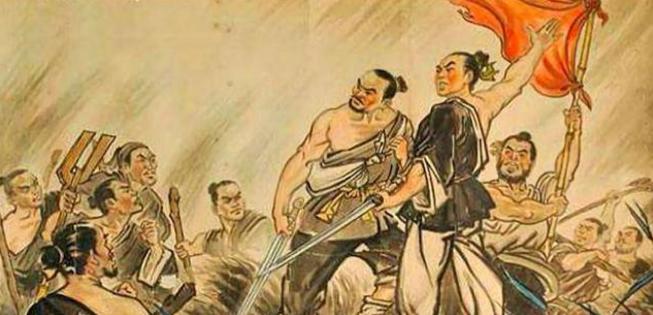History is the memory of things that have been said and done. —Carl Baker
In the last years of the Qin Dynasty, Hu Hai had no way out, and Zhao Gao gained power, resulting in the displacement of the people and the lack of livelihood. In the end, Chen Sheng and Wu Guang revolted in Daze Township, opening the prelude to the fight against the violent Qin.
Regarding chen sheng and Wu Guang's uprising, Sima Qian was extremely respected. The shijia in the historical records generally record the princes, and Chen Sheng wu guang was included in the shijia because of his first anti-Qin, so he was transferred to the shijia by Sima Qian. In the "History of the Chen Shijia", Sima Qian even called Wu Guang "a lover of people, and the soldiers are mostly users".

It can be seen that at least in Sima Qian's eyes, Chen Sheng's status of Wu Guang was the same. However, in fact, the two people's encounters after the uprising were very different, Chen Sheng was king, and Wu Guang was killed by colleagues. So why is there such a gap?
Wu Guang was a native of present-day Taikang, Henan, and in the first year of Qin II, he was the commander of Tun and escorted prisoners to Yuyang Commandery. On the way to Osawa Township, the team encountered heavy rain, the road was blocked, the deadline was delayed, and it could not arrive on schedule. According to the cool laws of the Qin Dynasty, all the conscripted border soldiers who did not arrive at the designated place on time were put to death. At that time, Wu Guang and Chen Sheng were both tun chiefs, and neither of them was a person who sat still and waited to die.
Chen Sheng was an insightful person, and he made an analysis of Wu Guang's situation and situation of their group at that time. When Wu Guangyi heard this, he greatly admired Chen Sheng's insight and strategy, and supported Chen Sheng's decision to "die the country" and "raise a big plan." Immediately afterward, Chen Sheng and Wu Guang engaged in a fish belly book collection and a bonfire fox song that broke the temple to pretend to be a ghost to create a momentum for their uprising. When Wu Guang saw that the time was ripe, he deliberately provoked the two officers escorting them, and was scolded and whipped by these two officers, causing public anger, and Wu Guang and Chen Sheng took the opportunity to kill the two officers. Subsequently, Chen Sheng and Wu Guang gathered 900 soldiers together and told them that the heavy rain had delayed the deadline, and that everyone was going to be beheaded. He shook his arms and lifted the pole.
Chen Sheng established himself as a general, with Wu Guang as his lieutenant, and in one fell swoop captured Daze Township and quickly captured the county seat of Puxian County. Subsequently, they captured Chen County in one fell swoop, and Chen Sheng established himself as king with the state name "Zhang Chu". Chen Sheng appointed Wu Guang as a false king and led an army to attack Xingyang in the west. However, Wu Guang led the rebel army to besiege Xingyang for a long time, and Chen Shengjiu sent Zhou Wen as a general to attack Qin in the west. The rebel army led by Zhou Wen broke through all the way and approached the Qin capital Xianyang. At this moment, Qin II Hu Hai panicked, and Qin II ordered the Shaofu Zhang Handan to organize hundreds of thousands of prisoners and slaves who built the Lishan Tomb into an army to meet the battle. The rebel army was defeated, and Zhou Wen committed suicide.
After the defeat of Zhou Wen's army, Zhang Handan led a large army to besiege Wu Guang. Faced with the oppression of the army, the internal contradictions of the rebel army were stimulated. The rebel general Tian Zang disagreed with the false king Wu Guang, believing that "the false king was arrogant, did not know the military power, could not be calculated, and was not punished", and killed Wu Guang. Wan Wan did not expect that Wu Guang did not die on the battlefield, but died at the hands of his own people, which was really enough!
In fact, the real cause of Wu Guang's death has been debated endlessly. One view is that the subordinates usurped power. Tian Zang was a man with personal ambitions, and unwilling to be under Wu Guang for a long time, he killed Wu Guang in order to usurp the leadership of the rebel army. There is also a view that Chen Sheng is behind the scenes. Chen Sheng "appointed cronies and killed the deceased in vain." According to the "History of Chen Shijia", after Tian Zang killed Wu Guang, he dedicated his first rank to Chen Sheng. "King Chen made Tian Zang Chu Ling Yin Yin and made him a general." It can be seen from this that Chen Sheng instructed Tian Zang, or acquiesced to Tian Zang's killing of Wu Guang.
Shortly after Wu Guang's death, Zhang Handan defeated Chen Sheng again, and Chen Sheng, on his way to escape, was killed by Zhuang Jia, a coachman who had followed him for several months. In this way, Chen Sheng and Wu Guang went from plotting the uprising to being defeated and killed, which was only half a year, but the anti-Qin fire they ignited burned most of the Qin Dynasty. Chen Sheng and Wu Guang are also heroes, but they died enough!